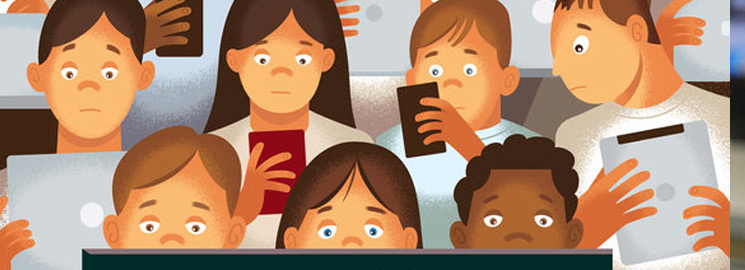Many parents are concerned about how much time their children spend on cell phones, gaming consoles and other digital media. Some experts say they should be concerned as there tends to be a growing body of research showing an association between unhappiness and the time adolescents spend on digital media. What is less clear is whether screen time is causing mental health problems or if children with worse mental health spend more time with digital media.
Perhaps the question should be whether screen use can be problematic for mental health. In an era when educational technology has deeply penetrated our schools—even preschoolers are handed tablets now—there are screens in all public places, and virtually everyone has interactive screen media at home and in their pockets, the concept of screen time as something that could be controlled is obsolete.
With one exception, screen time is less important to mental health than screen content and the context in which it is consumed and created. It is what children and adolescents are exposed to and encouraged to do with screens that helps or harms.
Where screen time becomes an issue is when it is displacing more productive or meaningful activities. For some young people, screen time can become compulsive, taking up more of their waking hours until they are functionally impaired. Based on my research over the past five years, there seems to be a dramatic increase in young people whose gaming, social media, and information-bingeing has resulted in sleep deprivation, school failure, relationship problems, anxiety and depression.
As a result, health care researchers have founded a clinic at Boston Children’s Hospital for children and adolescents with what they have termed: PIMU (Problematic Interactive Media Use) and other media-related disorders.
My research showed that girls who interacted more with social media at a young age (10 years old) had worse well-being by the age of 15 than young girls who interacted less.
There are distinct differences between boys and girls, particularly in regard to gaming and social media. This is in part biology and in part socialization. The studies so far is telling us that boys compete by seeking to prevail and girls by seeking acceptance. Boys can get immersed in gaming because no matter how well they do the games are designed so that they can always do better—and there is always someone, somewhere in the world, who can best them. On the other hand, girls seek acceptance in a competitive way on social media, which can contribute to anxiety because there is always someone who takes better vacations, has nicer outfits or a better-looking boyfriend.
I think it is screen use rather than screen time that is the issue, until the screen time displaces sleep, homework, or healthy relationships with family and friends. That said, we should teach our children that these devices and apps are tools to be used in mindful, healthy and balanced ways. We should observe our children, students and ourselves and, if we detect impairment or dysfunction, act to correct it.


Leave a Reply